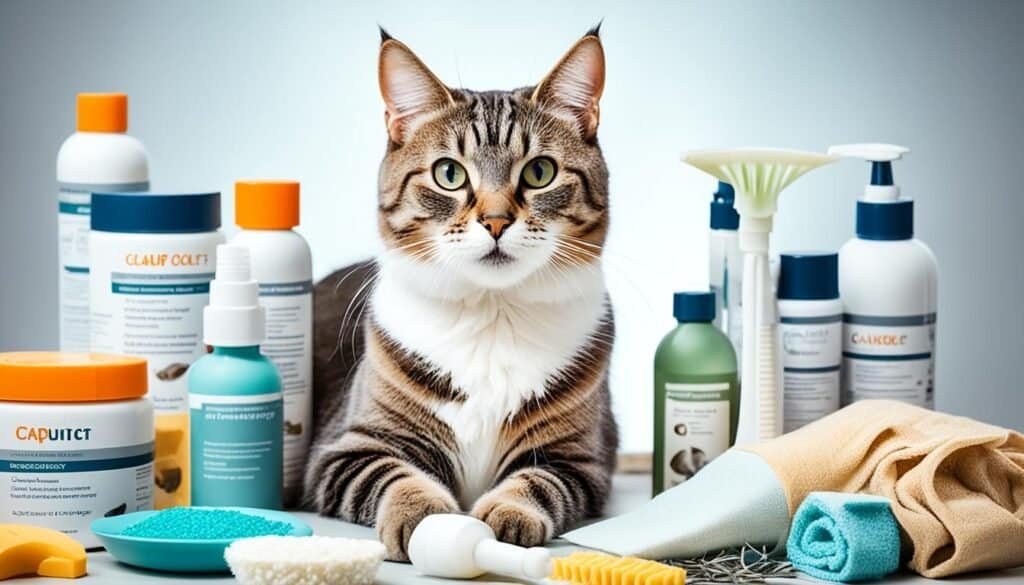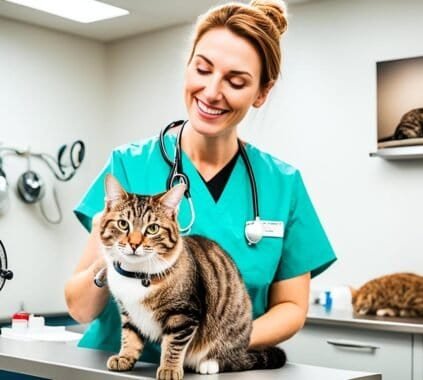Cat owners in the Philippines understand the importance of keeping their feline companions safe and healthy. One essential aspect of cat care is preventing parasites. These tiny organisms, such as fleas and worms, can cause discomfort, illness, and even pose a threat to human health. To ensure the well-being of your beloved cat and your family, it is crucial to implement effective cat parasite prevention measures.
Regular visits to the veterinarian are essential in managing cat parasites. During these visits, the veterinarian will assess your cat’s overall health and recommend preventive treatments suitable for your feline friend. Additionally, it’s important to monitor any changes in your cat’s behavior and appetite, as these can be signs of parasite infestation.
By following a veterinarian’s recommendations and using year-round heartworm and broad-spectrum parasite medications, you can provide your cat with comprehensive protection against harmful parasites. These medications are designed to target a wide range of internal and external parasites, ensuring that your cat remains parasite-free and healthy.
Key Takeaways:
- Regular veterinary visits and monitoring your cat’s behavior and appetite are crucial in preventing cat parasites.
- Year-round prevention is essential in managing internal parasites and protecting your cat’s health.
- Common external parasites, such as fleas and ticks, can be controlled through regular checks and appropriate prevention products.
- Personalized prevention plans tailored to your cat’s needs are highly effective in parasite control.
- Implementing a pet wellness plan can provide comprehensive care, including parasite prevention, at discounted rates.
Importance of Year-Round Prevention
When it comes to managing cat parasites, year-round prevention is crucial. Internal parasites, such as worms, can cause various health problems in cats, ranging from mild irritation to life-threatening illnesses. That’s why it’s important to prioritize preventive measures to keep your feline friends protected and healthy.
Regular heartworm tests and fecal examinations are highly recommended to ensure early detection and timely treatment of internal parasites. These tests can help identify any signs of infection, allowing for prompt intervention. Additionally, administering anthelmintic treatment to kittens and nursing mothers is essential to prevent the transmission of parasites.
“Year-round prevention is the key to keeping your cats free from internal parasites and maintaining their overall well-being.”
By following a comprehensive parasite prevention program, cat owners can provide the necessary protection to their beloved pets. This includes using appropriate medications and treatments recommended by your veterinarian. Remember, prevention is always better than treatment when it comes to safeguarding your cat’s health.
Common External Parasites in Cats
Cats are highly susceptible to external parasites that can infest their skin and cause discomfort. Two common external parasites that affect cats are fleas and ticks.
Fleas
Fleas are small, wingless insects that feed on the blood of animals, including cats. They can jump onto cats while they are outside or in contact with other infested animals. Fleas not only cause intense itching and discomfort but can also lead to anemia, particularly in young or weakened cats.
Regularly checking your cat’s coat for fleas is essential, especially after outdoor activities. Using appropriate cat flea prevention products can help control fleas and prevent infestations. These products are designed to kill fleas at various stages of their life cycle, from eggs to adult fleas. Year-round prevention is crucial to protect your cat from flea infestations and the related health problems they can cause.
Ticks
Ticks are small, blood-sucking parasites that can transmit serious diseases to both cats and humans. They attach themselves to the cat’s skin and feed on its blood. Ticks are commonly found in grassy or wooded areas and can latch onto cats while they are exploring outdoor environments.
Regularly checking your cat for ticks is important, especially if they spend time outdoors. Ticks should be removed carefully using tweezers to avoid leaving any mouthparts embedded in the skin. Consult with your veterinarian for recommendations on tick prevention products that are safe and effective for your cat. Using year-round heartworm and parasite prevention medications can also help control ticks and reduce the risk of tick-borne diseases.
Preventive Measures for External Parasite Control
To prevent external parasites in cats, it is crucial to take proactive measures that contribute to their overall health and well-being. Regular veterinary examinations and grooming routines play a significant role in detecting and addressing any signs of fleas, ticks, or coat abnormalities. Additionally, providing cats with cooked or prepared food and fresh, potable water can help boost their immune system and keep them healthy.
For kittens, biweekly deworming until they reach six months of age is essential to prevent internal parasites from proliferating. Furthermore, fecal exams should be conducted 2 to 4 times a year for adult cats to identify any underlying issues or infections. By tailoring parasite prevention programs to each cat’s lifestyle and considering the prevalence of parasites in the area, cat owners can effectively control and prevent parasitic infestations.
Grooming as a Preventive Measure
Grooming your cat regularly plays a crucial role in parasite prevention. Not only does it keep their coat clean and free from dirt and debris, but it also allows for thorough inspections for any signs of fleas, ticks, or other external parasites.
“Regular grooming allows you to detect parasites or abnormalities on your cat’s skin at an early stage,” says Dr. Maria Santos, a veterinarian at the Feline Wellness Clinic. “By spotting these issues early, you can prevent infestations from becoming more severe and causing discomfort to your feline friend.”
During grooming sessions, it’s important to be gentle and use appropriate tools, such as a fine-toothed comb or a flea comb, to check for fleas or ticks. Focus on areas like the neck, head, and behind the ears, where these parasites often hide.
Fecal Examinations for Adult Cats
Fecal exams are a crucial part of parasite prevention for adult cats. These tests allow veterinarians to detect the presence of internal parasites, such as worms, and determine appropriate treatment options. It is recommended to perform fecal exams 2 to 4 times a year, depending on the cat’s risk factors and lifestyle.
During a fecal exam, a small sample of the cat’s feces is examined under a microscope to identify any eggs, larvae, or adult parasites. Based on the results, the veterinarian can prescribe deworming medications tailored to the specific parasite(s) present.
Deworming for Kittens
Biweekly deworming is crucial for kittens until they reach six months of age. Kittens are more susceptible to internal parasites and can easily contract them from their mother or through their environment.
Dr. Santos advises, “Deworming kittens helps eliminate any parasites they may have acquired and prevents infestations that can lead to health issues. It is important to follow the veterinarian’s recommended deworming schedule to ensure the kittens receive the proper treatment.”
By following these preventive measures and working closely with a veterinarian, cat owners can protect their feline companions from external parasites and ensure their overall health and well-being.
| Grooming Tips for Preventing External Parasites | Frequency |
|---|---|
| Regularly inspect your cat’s skin and coat for signs of fleas, ticks, or abnormalities. | Daily |
| Use a fine-toothed comb or a flea comb to remove any fleas or ticks that you may find. | Weekly |
| Bathe your cat using a cat-friendly shampoo to remove any dirt or debris. | Every 4-6 weeks, or as needed |
| Trim your cat’s nails regularly to prevent scratching and potential entry points for parasites. | Every 2-4 weeks |
The Importance of Routine Wellness Exams
Routine wellness exams play a vital role in keeping cats healthy and ensuring their well-being. During these comprehensive checkups, veterinarians conduct a series of physical assessments to evaluate the cat’s overall health. These exams are essential for early detection of any signs of illness or parasites, enabling timely treatment and prevention.
During a routine wellness exam, the veterinarian will perform a thorough physical checkup, including:
- Listening to the cat’s heart and lungs
- Checking the cat’s weight and stance
- Inspecting the coat for any abnormalities or signs of external parasites
- Examining the ears, eyes, teeth, and gums for any issues
- Palpating the abdomen to check for any abnormalities or masses
These examinations provide valuable insights into the cat’s overall health and help identify any potential health concerns at an early stage. By detecting parasites early on, such as fleas or ticks, veterinarians can intervene promptly to prevent complications and ensure effective parasite control.
“Routine wellness exams are the cornerstone of preventive healthcare for cats. They allow veterinarians to catch and address issues early, ultimately improving the cat’s quality of life and reducing the risk of serious illness.” – Dr. Maria Santos, DVM
Besides parasite control, routine wellness exams also play a crucial role in vaccinations. These vaccinations protect cats against common and potentially life-threatening diseases, such as feline distemper (panleukopenia), feline viral rhinotracheitis, and feline calicivirus. By ensuring cats are up-to-date on their vaccinations, owners can provide them with essential protection against infectious diseases.
By prioritizing routine wellness exams for their cats, owners show their commitment to their pet’s health and well-being. These exams not only help keep cats free from parasites but also contribute to early disease detection and overall preventive care.

Benefits of Routine Wellness Exams
| Benefits | Description |
|---|---|
| Early Detection | Routine wellness exams help identify any signs of illness or parasites at an early stage, enabling prompt treatment and prevention. |
| Parasite Control | Veterinarians thoroughly assess cats for external parasites like fleas and ticks, ensuring effective prevention and control. |
| Vaccination | Wellness exams include vaccinations, protecting cats against common and potentially life-threatening diseases. |
| Peace of Mind | Regular checkups provide owners with reassurance about their cat’s health and well-being. |
Benefits of Pet Wellness Plans
Pet wellness plans are a great investment for cat owners to ensure the overall health and well-being of their feline companions. These comprehensive plans cover a range of preventive care services, including annual checkups, vaccinations, and parasite prevention.
By enrolling in a pet wellness plan, cat owners can experience several significant benefits:
1. Cost Savings
One of the primary advantages of pet wellness plans is the potential for cost savings. These plans typically offer discounted rates for essential veterinary services, allowing pet owners to access high-quality care without straining their budget.
2. Spread-Out Payments
Unlike paying for individual services as they arise, pet wellness plans allow cat owners to spread the cost of routine preventative care throughout the year. This helps eliminate the financial burden and ensures that cats receive the necessary care on a consistent basis.
3. Regular Veterinary Visits
Regular veterinary visits are crucial for managing cat parasites. By being part of a pet wellness plan, cat owners are more likely to schedule and attend these important appointments. Regular visits enable early detection and treatment of parasites, ensuring the well-being of the cat.
Pet wellness plans not only provide financial benefits but also promote a proactive approach to cat care, ultimately leading to better overall health and parasite management.
Personalized Parasite Prevention Plans for Cats
Every cat has unique needs when it comes to preventing parasites. Veterinary experts understand the importance of tailoring prevention plans to individual cats based on their medical history, lifestyle, and risk factors. By taking these factors into consideration, veterinarians can recommend the most suitable parasite prevention products or combinations of products to keep cats protected.
Working closely with a veterinarian is crucial in ensuring the chosen prevention plan is effective in safeguarding cats from harmful parasites. Through personalized prevention plans, cat owners can have peace of mind knowing that their feline companions are receiving the best possible protection.
Benefits of Personalized Prevention Plans
A personalized prevention plan offers numerous benefits for both cats and their owners. With these plans, the prevention of parasites can be more targeted and effective. The key advantages of personalized prevention plans include:
- Customized Protection: Personalized plans take into account the specific needs of each cat, providing tailored protection against parasites.
- Optimal Product Selection: Veterinarians can recommend the most suitable parasite prevention products or combinations of products based on each cat’s unique requirements.
- Effective Risk Management: Personalized plans assess the cat’s lifestyle and risk factors to develop comprehensive prevention strategies that effectively manage the risk of parasite infestation.
By investing in personalized prevention plans, cat owners can ensure their beloved pets receive the most appropriate protection against parasites, promoting their overall health and well-being.
Cat Parasite Prevention Plan Example
Here is an example of a personalized parasite prevention plan:
| Prevention Strategy | Recommended Products | Frequency |
|---|---|---|
| Flea Prevention | Topical flea control product | Once a month |
| Tick Prevention | Oral flea and tick medication | Once every 3 months |
| Heartworm Prevention | Monthly heartworm preventive medication | Once a month, year-round |
| Internal Parasite Prevention | Deworming medication | Every 3 to 6 months |
| Grooming and hygiene | Regular brushing and bathing | As needed |

Tips for Cat Owners in London
Cat owners in London, Ontario face specific challenges when it comes to managing and preventing cat parasites. The area is known for a high prevalence of various parasites, including fleas, ticks, lice, and mites. These parasites can cause discomfort, transmit diseases, and pose a risk to both cats and humans. To ensure the well-being of your feline companion and prevent the spread of parasites, it is important to follow these tips:
1. Regular Veterinary Checkups
Schedule regular checkups with a veterinarian who can assess your cat’s overall health and recommend appropriate parasite prevention strategies. By conducting routine examinations, your veterinarian can detect early signs of infection and tailor a prevention plan to your cat’s unique needs.
2. Consult with Your Veterinarian
Work closely with your veterinarian to determine the best parasite prevention products for your cat. Each cat may require different products or a combination of products to effectively manage parasites. Your veterinarian can help you choose the most suitable options based on factors such as your cat’s age, lifestyle, and risk factors.
3. Maintain a Clean Living Environment
Regularly clean and vacuum your home to remove any potential sources of parasites, such as fleas or ticks. Pay extra attention to areas where your cat spends a lot of time, including bedding, furniture, and carpeted areas. Washing your cat’s bedding regularly and keeping the living environment clean can help minimize the risk of infestation.
4. Use Effective Parasite Prevention Products
Invest in high-quality, veterinarian-recommended parasite prevention products. These may include topical treatments, oral medications, or collars designed to protect against a range of parasites. Follow the instructions provided by your veterinarian or the product manufacturer for proper application and dosage.
5. Be Vigilant about Grooming
Frequently groom your cat to check for signs of parasites, such as fleas or ticks. Regular brushing can help remove any loose fur or debris and provide an opportunity to inspect your cat’s skin for any abnormalities or pests. Pay attention to areas where parasites are commonly found, such as around the ears, neck, and tail.
6. Educate Yourself
Stay informed about the common parasites in your area and the prevention methods available. Understanding the lifecycle, signs, and symptoms of different parasites can help you detect and manage them effectively.
7. Practice Proper Hygiene
Practice good hygiene to minimize the risk of parasite transmission. Wash your hands thoroughly after handling your cat, especially if you suspect they may have come into contact with parasites. Additionally, ensure proper disposal of cat feces to prevent the spread of intestinal parasites.
By following these tips and working closely with your veterinarian, you can effectively manage and prevent cat parasites in London, Ontario. Remember, prevention is key to keeping your cat healthy and happy.
Key Questions about Cat Parasite Prevention
As a cat owner, you may have several questions about cat parasite prevention. Understanding the importance of prevention and having the right information is crucial in ensuring the health and well-being of your feline friend. Here are answers to some frequently asked questions regarding cat parasite prevention:
1. Why is seasonal prevention important for indoor cats?
Even if your cat spends most of its time indoors, parasites can still find their way into your home through various means. Parasites like fleas and ticks can hitch a ride on clothing or other pets, increasing the risk of infestation. Therefore, it is essential to maintain year-round prevention to protect your indoor cat from potential parasite threats.
2. When should kittens start receiving parasite prevention?
Kittens should start their parasite prevention regimen at an appropriate age. Your veterinarian can determine the ideal time to begin prevention based on the kitten’s health and development. Starting prevention early ensures that your kitten is protected from the start and helps prevent the spread of parasites to other pets or family members.
3. Are there specific products for different parasites?
Yes, there are specific products available to target different parasites. Fleas and ticks, for example, require different preventive measures. Flea preventives often come in the form of spot-on treatments or oral medications, while tick preventives may be available as collars or topical solutions. Your veterinarian can recommend the most suitable products for your cat based on their specific needs.
4. How much do parasite prevention products cost?
The cost of parasite prevention products can vary based on factors such as the weight of your cat and the duration of treatment. It is best to consult with your veterinarian to get an accurate estimate of the costs involved. While prevention products may require an initial investment, they are essential in safeguarding your cat’s health and preventing potential complications caused by parasites.
5. Why is it necessary to consult with a veterinarian?
Consulting with a veterinarian is crucial for an accurate diagnosis and personalized prevention plan. A veterinarian can assess your cat’s specific needs, take into account any underlying health conditions, and recommend the most effective preventive measures. They can also provide guidance on the proper use of prevention products and address any concerns or questions you may have.
“Effective parasite prevention starts with knowledge and proactive measures. By staying informed and working in partnership with your veterinarian, you can ensure that your cat remains protected from harmful parasites.”
Remember, prevention is always better than cure when it comes to managing parasites in cats. By following the advice of your veterinarian and implementing a comprehensive parasite prevention plan, you can help your cat live a healthy and parasite-free life.
| Question | Answer |
|---|---|
| Why is seasonal prevention important for indoor cats? | Seasonal prevention is important as parasites can enter the home through various means and cause infestation. |
| When should kittens start receiving parasite prevention? | Kittens should start prevention at an appropriate age to ensure their protection and prevent the spread of parasites. |
| Are there specific products for different parasites? | Yes, there are specific products available for different parasites like fleas, ticks, and worms. |
| How much do parasite prevention products cost? | The cost of prevention products varies based on factors like weight and treatment duration. |
| Why is it necessary to consult with a veterinarian? | Consulting with a veterinarian ensures an accurate diagnosis and personalized prevention plan. |
Conclusion
Cat parasite prevention is an essential responsibility for pet owners in the Philippines. By implementing effective preventive measures, such as regular veterinary checkups and year-round prevention medications, cat owners can protect their feline friends from harmful parasites and ensure their overall health and well-being. Additionally, personalized prevention plans created by veterinarians can cater to each cat’s unique needs, considering factors like their medical history, lifestyle, and risk factors.
By prioritizing cat parasite prevention, not only are cat owners safeguarding the health of their beloved pets, but they are also protecting their families from potential diseases. Parasites can pose a risk to both cats and humans, making it crucial to create a parasite-free environment. With comprehensive prevention strategies in place, cats in the Philippines can lead healthy and happy lives, free from the risks posed by parasites.
Remember, responsible pet ownership includes regular veterinary checkups, year-round prevention medications, and personalized prevention plans. By staying informed and taking proactive measures, cat owners can ensure that their feline friends are protected from parasites and enjoy a long and fulfilling life.
FAQ
What can I do to prevent cat parasites?
Why is year-round prevention crucial for managing cat parasites?
What are the common external parasites in cats?
How can I prevent external parasites in my cat?
Why are routine wellness exams important for cats?
What are the benefits of pet wellness plans?
How can I create a personalized parasite prevention plan for my cat?
What are some tips for cat owners in London to prevent parasites?
What are some key questions about cat parasite prevention?
How important is cat parasite prevention?
Last modified: February 20, 2024














[…] Witnessing seizures in your cat can be a terrifying experience. It’s important to handle these situations with care to ensure their safety and provide the necessary first aid. Follow these steps to effectively manage seizures in cats: […]
[…] They will then provide you with specific dietary recommendations and portion sizes to help your cat achieve their weight-loss goals effectively and […]
[…] Additionally, reading customer reviews and feedback can help you gauge the palatability and effectiveness of different cat food […]
[…] toothbrushing is the most effective method for preventing periodontal disease in cats. By incorporating this routine into your cat’s dental care regimen, you can significantly […]
[…] Cat heartworm disease is caused by parasitic worms that primarily affect the heart and lungs. Mosquitoes are responsible for transmitting […]
[…] taking these precautions, cat owners can help safeguard their feline companions from the detrimental effects of heartworm and ensure their […]
[…] your cat closely for any unusual symptoms or behaviors following vaccination. Some cats may experience mild side effects, such as lethargy or slight swelling at the injection site, which typically subside within a day or […]
[…] furry friend while keeping an eye out for any potential health concerns. Here are some essential cat care tips for effective […]
[…] play into your cat’s daily routine is a simple yet effective way to provide them with engaging play sessions and stimulating play activities. Keep them […]